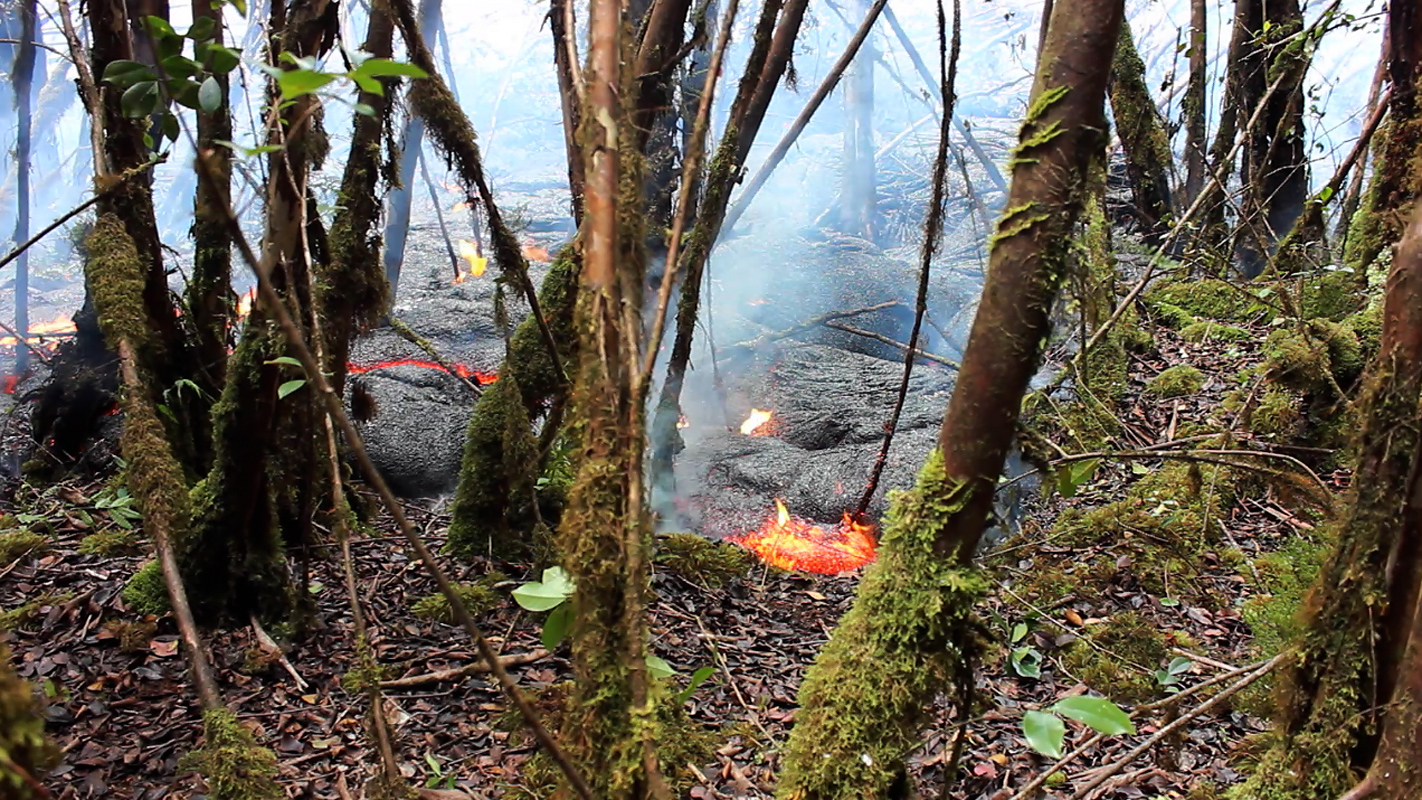Pahoa residents Josh Ballauer, Jeremiah Lofgreen and Matt Tavares document the 2014 Kilauea lava flow that threatened their Hawai‘i Island neighborhood of Kaohe Homesteads, and how their community came together during the crisis.
Why do this film?
Jeremiah: We were at a friend’s house; he was really close to the lava coming down. We saw the national news media was here covering the story. We saw one of our friends get interviewed and then we saw their cut later on, and we realized that it didn’t portray what we were going through and what we witnessed. It was kind of an off the cuff thing and we just said, “You know what, we’ve got cameras – why don’t we just do this ourselves?”
When did the lava flow really start to threaten the community?
Jeremiah: It must have been around August 23, 2014. It was kind of shock, mostly to our neighborhood, because we were closest in proximity to the flow at the time. There was Civil Defense coming up into the neighborhood and informing us. At that time, the rest of the community had only heard what was on the news. We were hearing firsthand from the Civil Defense and other members of the [Hawai‘i] County. It was kind of a shocker to a lot of people here. It seemed like there was a couple of weeks that went by until the rest of the community caught on to what was coming down the hill.
Was the story that the media was portraying very different from what you were experiencing yourselves?
Jeremiah: Absolutely. I think the fear that was portrayed was very short-lived. I think a lot of us realized that we all knew we came to this place on the side of a volcano. I think without it in your face all the time, you tend to forget about it, but once we were brought to the awareness that it’s right there, it’s only a mile away, it reminded a lot of people that, yes, we live on the side of a volcano.
My experience was, a lot of people at first, for about a week, it was kind of a shocker, and then the acceptance started to happen pretty quickly. A lot of people in the neighborhood moved out, Josh being one of them. My wife and myself, we were expecting a baby, and she was two days late on her due date when we found out about the lava. We had so much going on in our minds that there wasn’t a lot of energy that we could put into that, even though we needed to. It was a very surreal time already, and that just made it, for myself, even more surreal.
Josh: The media only focused on the fear aspect of it all. Of course, being a part of the community down here, all we saw was camaraderie happening. The aloha was so high. We’ve never seen aloha like that, really, and it’s too bad that it takes a disaster like that for aloha to come out like that, but everybody was so nice and friendly. The media should have been covering that.
Jeremiah: That’s the importance we saw right away. Unless this is shown from a local’s perspective, someone that’s actually witnessing it first-hand, that the story wouldn’t be told in the right kind of way.
Was there ever a point where you were like, “Screw this film – I gotta take care of my family”?
Jeremiah: It was an internal battle for sure. When I would go out to work on the film, I wanted to be back with my family. When I was with my family, there was only so much I could do, but I was thinking about moving forward. I went back and forth with myself a lot. I’m pretty sure I told Josh about 20 times, “I’m not sure I can do this.” And then I would turn around and say, “Let’s go do this.” There was definitely a personal battle there, and it was really hard on my family to do it. Once we had come up with a plan of what to do with our stuff, and make sure we were safe, I felt that I needed to go out and help people out. We offered up our help for moving, and the people that we asked, they just wanted us to document, in case the town was taken, in case their place was taken. They wanted something to remember it by. That’s kind of the premise that we started off with – just to document what we were going through, and if people lost their places, they wanted to see what they had built, what they had.

